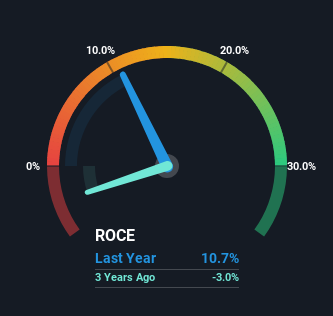- United States
- /
- Food and Staples Retail
- /
- NasdaqCM:DTCK
Davis Commodities (NASDAQ:DTCK) Is Looking To Continue Growing Its Returns On Capital
Did you know there are some financial metrics that can provide clues of a potential multi-bagger? Typically, we'll want to notice a trend of growing return on capital employed (ROCE) and alongside that, an expanding base of capital employed. Ultimately, this demonstrates that it's a business that is reinvesting profits at increasing rates of return. Speaking of which, we noticed some great changes in Davis Commodities' (NASDAQ:DTCK) returns on capital, so let's have a look.
What Is Return On Capital Employed (ROCE)?
Just to clarify if you're unsure, ROCE is a metric for evaluating how much pre-tax income (in percentage terms) a company earns on the capital invested in its business. To calculate this metric for Davis Commodities, this is the formula:
Return on Capital Employed = Earnings Before Interest and Tax (EBIT) ÷ (Total Assets - Current Liabilities)
0.11 = US$1.1m ÷ (US$30m - US$19m) (Based on the trailing twelve months to December 2023).
So, Davis Commodities has an ROCE of 11%. That's a relatively normal return on capital, and it's around the 9.2% generated by the Consumer Retailing industry.
View our latest analysis for Davis Commodities

While the past is not representative of the future, it can be helpful to know how a company has performed historically, which is why we have this chart above. If you want to delve into the historical earnings , check out these free graphs detailing revenue and cash flow performance of Davis Commodities.
What Does the ROCE Trend For Davis Commodities Tell Us?
Davis Commodities has recently broken into profitability so their prior investments seem to be paying off. Shareholders would no doubt be pleased with this because the business was loss-making three years ago but is is now generating 11% on its capital. And unsurprisingly, like most companies trying to break into the black, Davis Commodities is utilizing 335% more capital than it was three years ago. We like this trend, because it tells us the company has profitable reinvestment opportunities available to it, and if it continues going forward that can lead to a multi-bagger performance.
One more thing to note, Davis Commodities has decreased current liabilities to 64% of total assets over this period, which effectively reduces the amount of funding from suppliers or short-term creditors. This tells us that Davis Commodities has grown its returns without a reliance on increasing their current liabilities, which we're very happy with. However, current liabilities are still at a pretty high level, so just be aware that this can bring with it some risks.
Our Take On Davis Commodities' ROCE
Long story short, we're delighted to see that Davis Commodities' reinvestment activities have paid off and the company is now profitable. And since the stock has dived 77% over the last year, there may be other factors affecting the company's prospects. Still, it's worth doing some further research to see if the trends will continue into the future.
Since virtually every company faces some risks, it's worth knowing what they are, and we've spotted 4 warning signs for Davis Commodities (of which 1 doesn't sit too well with us!) that you should know about.
For those who like to invest in solid companies, check out this free list of companies with solid balance sheets and high returns on equity.
New: Manage All Your Stock Portfolios in One Place
We've created the ultimate portfolio companion for stock investors, and it's free.
• Connect an unlimited number of Portfolios and see your total in one currency
• Be alerted to new Warning Signs or Risks via email or mobile
• Track the Fair Value of your stocks
Have feedback on this article? Concerned about the content? Get in touch with us directly. Alternatively, email editorial-team (at) simplywallst.com.
This article by Simply Wall St is general in nature. We provide commentary based on historical data and analyst forecasts only using an unbiased methodology and our articles are not intended to be financial advice. It does not constitute a recommendation to buy or sell any stock, and does not take account of your objectives, or your financial situation. We aim to bring you long-term focused analysis driven by fundamental data. Note that our analysis may not factor in the latest price-sensitive company announcements or qualitative material. Simply Wall St has no position in any stocks mentioned.
About NasdaqCM:DTCK
Davis Commodities
An investment holding company, operates as an agricultural commodity trading company in Africa, China, Indonesia, Vietnam, the Philippines, Thailand, Singapore, and internationally.
Mediocre balance sheet with low risk.
Market Insights
Community Narratives


